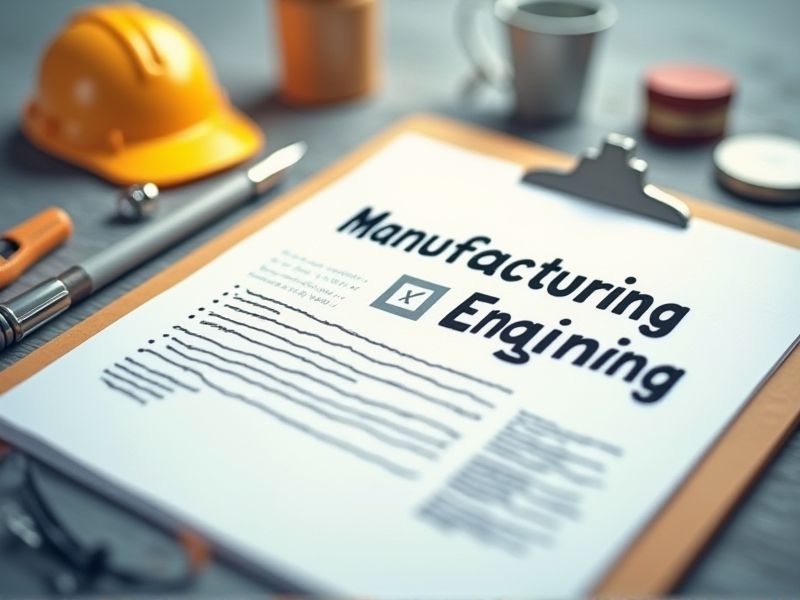
Manufacturing engineers play a crucial role in optimizing production processes, thus requiring certifications to ensure streamlined and efficient operations. Technological advancements and evolving industry standards necessitate these professionals to stay updated with specialized skills. Certifications demonstrate expertise in areas like quality control, lean manufacturing, and process improvement, enhancing both credibility and career prospects. Here are some important certifications needed for a manufacturing engineer.
Six Sigma Green Belt Certification
Obtaining a Six Sigma Green Belt Certification is essential for a manufacturing engineer because it equips them with skills to enhance process efficiency, directly reducing production costs. This certification provides the knowledge to apply data-driven decision-making, therefore improving product quality and customer satisfaction. Mastery of Six Sigma methodologies allows engineers to identify and rectify bottlenecks, leading to increased operational efficiency. Green Belt Certification also boosts career prospects, as many manufacturing companies value expertise in process improvement techniques.
Six Sigma Black Belt Certification
Six Sigma Black Belt Certification significantly enhances a manufacturing engineer's expertise in process improvement and quality management, leading to increased operational efficiency. The certification equips engineers with advanced statistical tools and methodologies, enabling them to identify and eliminate defects in manufacturing processes. Skilled Black Belt professionals drive cost reductions by minimizing waste, which directly impacts the company's profitability. As industries increasingly prioritize data-driven decision-making, having this certification positions manufacturing engineers as valuable assets in competitive market environments.
Lean Manufacturing Certification
Lean Manufacturing Certification helps manufacturing engineers streamline processes, leading to reduced waste and increased efficiency. Enhanced process efficiency typically results in cost savings, making businesses more competitive. Certified engineers often experience career advancement due to their recognized expertise in lean principles. Companies employing certified engineers often see improvements in product quality, which enhances customer satisfaction.
Certified Manufacturing Engineer (CMfgE)
The Certified Manufacturing Engineer (CMfgE) credential enhances a manufacturing engineer's expertise by verifying comprehensive knowledge in manufacturing processes and systems. This certification signifies a commitment to professional development and continuous learning, which often leads to increased job opportunities and career advancement. The CMfgE qualification ensures engineers possess updated skills that align with industry standards, optimizing efficiency and productivity within the manufacturing environment. Employers value the CMfgE as it demonstrates the engineer's ability to integrate complex systems, improve processes, and contribute effectively to organizational goals.
Certified Quality Engineer (CQE)
Certified Quality Engineers (CQEs) play a critical role by ensuring that manufacturing processes adhere to high standards, leading to reduced defects and enhanced product reliability. Their expertise in quality management principles helps identify inefficiencies and implement corrective actions, which can reduce costs and improve overall operational efficiency. CQEs possess the skills to design and interpret quality measurement systems, thus supporting data-driven decision-making essential for maintaining competitive advantage. Their knowledge in auditing and process improvement fosters a culture of continuous improvement, vital for adapting to evolving market demands.
APICS Certified in Production and Inventory Management (CPIM)
APICS CPIM certification enhances a manufacturing engineer's understanding of production and inventory processes, leading to improved efficiency. It equips engineers with the knowledge to make data-driven decisions that optimize resource allocation. The certification also fosters better communication between engineering and supply chain teams, reducing operational silos. Manufacturing engineers with CPIM credentials often contribute to cost reductions and increased productivity in production settings.
APICS Certified Supply Chain Professional (CSCP)
A Manufacturing Engineer benefits from the APICS Certified Supply Chain Professional (CSCP) as it deepens their understanding of supply chain management, enhancing efficiency in production processes. This certification equips them with strategic skills to optimize logistics and inventory management, reducing operational costs. As supply chains become more global and complex, a CSCP certification ensures that engineers can adeptly manage challenges, improving overall production reliability. Employers often seek professionals with CSCP credentials, as it signals a commitment to industry standards and knowledge of best practices in supply chain operations.
Project Management Professional (PMP)
PMP certification enhances a manufacturing engineer's ability to manage complex projects, ensuring they meet deadlines and stay within budget. It equips them with standardized project management methodologies, improving efficiency and communication across engineering teams. This credential increases their credibility, potentially leading to career advancement and higher salaries within the manufacturing sector. It also aligns their skills with global project management standards, making them more competitive in the international market.
OSHA Safety Certification
OSHA Safety Certification reduces workplace accidents by equipping manufacturing engineers with essential safety protocols. Employers often require this certification to ensure compliance with federal regulations, minimizing legal risks and potential fines. Trained engineers can effectively identify and mitigate hazards, promoting a safer work environment for all employees. Knowledge of OSHA standards enhances the engineer's ability to design processes and layouts that inherently prioritize worker safety.
Certified Reliability Engineer (CRE)
A Certified Reliability Engineer (CRE) provides expertise in designing and implementing systems that ensure consistent product quality, reducing unexpected downtimes in manufacturing. Incorporating CRE insights can lead to cost savings by minimizing warranty claims and extending equipment lifespan. The presence of a CRE helps in identifying potential failure modes early, enhancing overall operational efficiency. Their specialized knowledge in reliability principles supports continuous improvement initiatives, fostering greater customer satisfaction through dependable production processes.
Summary
When you, as a Manufacturing Engineer, obtain certifications, your professional credibility significantly increases. You can expect enhanced job prospects as employers prioritize certified candidates due to their demonstrated expertise. Your ability to implement efficient processes often improves, potentially leading to cost savings and higher productivity. Organizations may also rely more on you for strategic decision-making, positively impacting your career trajectory.
